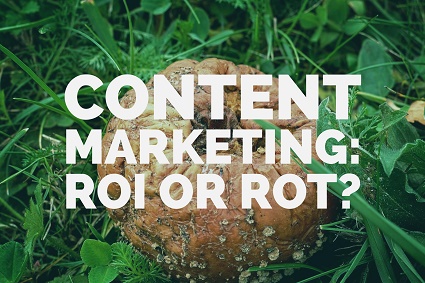I’m not sure who came up with the acronym ROT to describe content that is redundant, outdated, or trivial, but it’s a good acronym. When you’re thinking about the return on investment of your content marketing efforts, it makes sense to clean up the content you currently have on your website. We’re working right now with an organization that provides lots of programs and retreats for health and wellness. Their current website is a treasure trove of useful, valuable information for their target audience, persuasive promotions for their goods and services… and old PDF flyers. It’s like a beautiful office with a box of old papers in the corner. The site owners didn’t even know those PDFs were still live on the web.
This is a clear cut example. Most websites don’t have such a clear division between useful things and those that probably shouldn’t make the cut. It’s common to have a lot of content, some of which was strategically planned and some of which no longer makes sense for your website or your organization. The ROT acronym can help you decide what to keep and what to remove.
Redundant
Do you have duplicate content — content copied from elsewhere on the web or repeated in multiple places on your website? Get rid of it. Quickly. Google doesn’t value duplicate content.
Do you have a blog with a new… but not really … post about seasonal allergies every season? We write about seasonal topics for our clients each year, but make sure to include new information, a different angle, or a new viewpoint. If you haven’t been doing that, you could find half a dozen reminders to get a colonoscopy, one for each National Colon Cancer Awareness Month your website has been online. Spruce up the best or the most recent, and get rid of the rest.
Even more important, you should avoid having a page for each year’s Cinco de Mayo sale, or a nearly-identical welcome page for every new hire, or a re-post of an annual government announcement. If it’s pretty much the same every year, or every month, or every week, then it is of limited value. Certainly, don’t use manufacturer’s product descriptions or other canned content.
Your web content should be fresh and original.
Out of date
This is a harder call than finding redundant content. Team pages for people who no longer work with you should be deleted, but news from the past may still be bringing traffic and adding value. Stories about your community involvement from the past continue to tell your story. Good blog posts continue to answer people’s questions. Basic information — as long as it’s still correct — is still valuable.
But most sites that we work with come to us with some outdated information. Typically, the site owners didn’t realize it still needed changing. “Oh, no, ” they’ll say, “We closed the Springfield branch two years ago.” It’s easy to miss outdated information, especially if you don’t have a webmaster whose job it is to keep your information up to date. Sometimes outdated information hangs around until someone notices… or you have your website redesigned.
Update any information that needs updating. Don’t change the page title or URL without a good reason. Change the date if you want to.
Some posts or pages may need deletion. But never make that decision without checking your analytics. We’ve had clients tell us that they felt some page was out of date or needed to be deleted, only to discover that it was a very popular page. We update those pages rather than removing them.
Trivial
Do you have pages or posts that don’t really make a point? Do you have “spun” articles that just regurgitate the same information found all over the web? Are there poor quality posts and pages lurking around the edges of your website?
These pages aren’t doing you any good. You might want to update them with better content, or you might want to let them go. Either way, don’t write any new trivial pages.
Google works hard to find the best pages for the keywords and phrases people type into the search box. Removing the ROT from your website will make it more likely that Google will choose your website. And that will definitely increase your ROI.


Leave a Reply